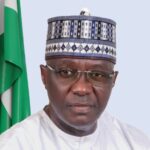The Speaker of the House of Representatives, Hon. Abbas Tajudeen, has said that the persistent underrepresentation of women in decision-making positions across various sectors in the country is disheartening.
He said this on Thursday in Abuja at a one-day high-level national summit on Constitutional Inclusion of Women in Governance tagged #WomenCanLead, organised by the African Centre Leadership, Strategy and Development (Centre LSD) with support from the Foreign, Commonwealth, and Development Office (FCDO) through Policy and Legal Advocacy Centre (PLAC).
Abbas who said that it was instructive to recognise the critical role that women play within society, also decried systemic barriers that hinder women’s participation and limit their ability to influence policies that affect their lives and communities.
Represented by Hon Fatima Talba, he said current statistics revealed that women constitute approximately 49.45 per cent of Nigeria’s total population as of 2023.
- ‘Their retirement long overdue’, Dokpesi Jnr justifies Shake-up at DAAR Communications
- US, Nigeria working to maximise benefits of AI in military operations
The Speaker said aside from the demographic strength of women, they also have the potential to drive transformative change in the country.
“Women are not just passive participants in our society; they are vital contributors to economic growth, social development, and community resilience. Their voices must therefore be amplified and their contributions recognised if we are to realise the full potential of our nation.
“Despite this demographic advantage, it is disheartening to note that women’s representation in governance has not kept pace with their numbers. Over the years, we have witnessed a persistent underrepresentation of women in decision-making positions across various sectors.
“This disparity is not merely a statistic; it reflects systemic barriers that hinder women’s participation and limit their ability to influence policies that affect their lives and communities,” he said.
The Speaker said that the summit provided a crucial platform for harmonising efforts among all stakeholders, including government officials, civil society organisations, private sector representatives, and international partners to forge a united front in advocating for women’s constitutional inclusion.
He said that in examining the electoral outcomes from the 2015 and 2019 elections, it is evident that women’s political representation remains disproportionately low compared to their population size.
He said, “In the 2015 and 2019 elections, a total of 2,970 candidates were on the electoral ballot, which accounted for only 11.36 per cent of elected candidates being women. This statistic underscores a significant gender disparity in political representation.
Earlier, the Executive Director, Centre LSD, Mr Monday Osasah, said that Nigeria lags far behind the sub-Saharan average concerning female political representation.
Osasah, represented by Ms Magret Fagboro said that Nigeria ranks among the 10 lowest performers, with less than four per cent female representation in the national parliament compared to countries like Rwanda (61.25 per cent), South Africa (46.1 per cent), Namibia (44.23 per cent), Senegal (38.21 per cent), Mozambique (36.86 per cent) and others.
“In other words, the statistical profile of women in governance in Nigeria is way out of sync with the country’s demographic sex composition; neither does it reflect the educational and professional status of Nigerian women,” Osasah said.
Also, the founding Executive Director of the Centre LSD, Dr Otive Igbuzor, urged the 10th National Assembly to pass the five gender bills rejected by the previous assembly.
He said that this move aims to increase women’s representation in Nigeria’s government, which currently stands at a mere 4%.
Igbuzor also highlighted the global trend of increasing women’s participation in politics, citing a rise from 11% in 1994 to 25% in 2023.

 Join Daily Trust WhatsApp Community For Quick Access To News and Happenings Around You.
Join Daily Trust WhatsApp Community For Quick Access To News and Happenings Around You.


